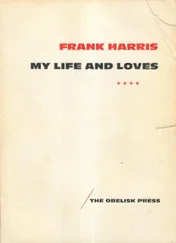Frank Harris - My life and loves Vol. 2
Здесь есть возможность читать онлайн «Frank Harris - My life and loves Vol. 2» весь текст электронной книги совершенно бесплатно (целиком полную версию без сокращений). В некоторых случаях можно слушать аудио, скачать через торрент в формате fb2 и присутствует краткое содержание. Жанр: Эротика, Секс, на английском языке. Описание произведения, (предисловие) а так же отзывы посетителей доступны на портале библиотеки ЛибКат.
- Название:My life and loves Vol. 2
- Автор:
- Жанр:
- Год:неизвестен
- ISBN:нет данных
- Рейтинг книги:4 / 5. Голосов: 1
-
Избранное:Добавить в избранное
- Отзывы:
-
Ваша оценка:
- 80
- 1
- 2
- 3
- 4
- 5
My life and loves Vol. 2: краткое содержание, описание и аннотация
Предлагаем к чтению аннотацию, описание, краткое содержание или предисловие (зависит от того, что написал сам автор книги «My life and loves Vol. 2»). Если вы не нашли необходимую информацию о книге — напишите в комментариях, мы постараемся отыскать её.
My life and loves Vol. 2 — читать онлайн бесплатно полную книгу (весь текст) целиком
Ниже представлен текст книги, разбитый по страницам. Система сохранения места последней прочитанной страницы, позволяет с удобством читать онлайн бесплатно книгу «My life and loves Vol. 2», без необходимости каждый раз заново искать на чём Вы остановились. Поставьте закладку, и сможете в любой момент перейти на страницу, на которой закончили чтение.
Интервал:
Закладка:
When he returned from Windsor, the news of his resignation had preceded him and created an extraordinary sensation: it was whispered with bated breath that he had used the Queen's letter paper to write his resignation to Lord Salisbury, as if Randolph could ever have thought that anyone would imagine he would steal dignity from an invitation to Windsor. Lord George Hamilton went down in the train with him to Windsor and tells us that even then Randolph had made up his mind to resign. In gratitude for some earlier support from The Times, Randolph had given that paper the first news and editor Buckle chastized him very courteously in two whole columns. The same morning I got a line asking me to come to see him; I went up to Connaught Place with heavy heart about eleven o'clock. The rows of carriages about the house startled me and the house itself was crammed with Tory members of Parliament. I caught Randolph between two rooms. "What d'ye think of it?" he cried, joyously bubbling over. "More than two hundred and fifty Tory members come to attest their allegiance to me: I've won; the 'old gang' will have to give in." But he had reckoned without Salisbury's obstinacy and dislike.
Nothing happened for days and I got another note. Again I went to Connaught Place, empty now, the rooms, and deserted. Randolph came to me.
"The rats desert the sinking ship," he began gloomily. "Salisbury has cabled Harrington to return from the continent and in a week he'll arrive."
"Will Hartington help him?" I asked. "He had a great opinion of you, I know," and I told him how Hartington had praised his leadership of the House to me and how convincing the praise was, because those who praised most highly were the best judges. At first Randolph seemed dejected, but in the course of talk he told me how he had won the Queen at dinner and how she told him she regarded him as a true statesman. "A great woman," he added, "one of the wisest and best of women."
A few days later Hartington arrived; Randolph met him at the railway station and was profoundly impressed. "A noble man," he said afterwards, gravely. "He assured me that he regarded me as a born Conservative leader and would do nothing to embarrass me." A couple of days later he told me in wonderment that Salisbury had offered to serve with or under Hartington and that Hartington had refused: "I must win now; that's Salisbury's last card."
But it wasn't. A couple of days later I called upon him; he met me with the exclamation: "I'm dished. Goschen will be Chancellor; I had forgotten Goschen." He went on to tell me that Mrs. Jeune had suggested it to him. "As soon as she mentioned the name," he said, "I felt struck through the heart. I knew it was all over." And it was. "Old Morality," W. H. Smith, undertook to lead the House and Goschen made himself responsible for the finances and Randolph was out in the cold.
I tried to persuade him that nothing was really lost. "The corner seat below the gangway," I cried, "and your most stinging criticism and in six months 'Old Morality' will be glad to get back to his bookshop, and…"
He shook his head to my utter wonder. "I can't," he said. "I am a Conservative;
I can't. Ah! If it were Gladstone in power, I'd get to work at once. I can't fight my own side." But he had fought his own side on the Brad-laugh business six years before; why had he changed?
"Why on earth then did you resign?" rose to my lips, but I said nothing.
The tragedy was complete without comment.
One more incident, for the fallen lion was to get more than one kick. Strange it was that from 1880 to his resignation in 1886 everything seemed to favor and help him. After his resignation everything went against him.
Astonishingly good luck in a series and then astonishingly bad luck. Yet just at first everything seemed to go well; all through the session of 1887 there were rumors of reconciliation. People were so under the spell of Randolph's consummate leadership and masterful personality that they felt sure he would break out in some new way; he must have something up his sleeve.
Then came tidings of a pact with Chamberlain and the mirage of a Center party. As leader of the House, "Old Morality" Smith, without an "h" to his name, was almost absurd. The rumor grew; then Bright died and Central Birmingham was vacant. At once I heard through Louis Jennings, Randolph's best friend and also a good friend of mine, that Randolph, sick of Paddington and villadom, was going to stand for Bright's old seat and make Torydemocracy a reality. But Chamberlain would not hear of such a rival near his throne; he told Hicks-Beach that if Randolph stood for Central Birmingham, the unwritten compact between the Liberal Unionists and the Conservatives would be broken and he would consider himself free to act as he pleased.
Hicks-Beach at first fought for Randolph: he had always the highest opinion of Randolph's genius. When Gladstone fell in 1886, Lord Salisbury called Hicks-Beach with Randolph to determine who should lead the Lower House.
Hicks-Beach's claim was older and many would have said better founded; he was a man of high character, great experience and real ability, but he wouldn't hear of any comparison. Randolph, he declared, was the first choice in every way: he must be the Leader and he, Hicks-Beach, would take a place under him. Now he hated to wound Randolph but Chamberlain was inexorable. As Hicks-Beach hesitated, Chamberlain set Lord Harrington to work and Harrington's intervention settled the matter: Randolph must give up the idea of representing Central Birmingham or destroy the coalition.
Randolph left the decision to Hicks-Beach and Hicks-Beach told him he must save the party and withdraw. Randolph felt the blow intensely. The news had got out, and to be beaten by Chamberlain, he felt, was humiliating.
Randolph went racing, began to bet heavily and at first made money. People smiled as at the aberrations of a boy.
A year or so later came another blow. The government announced its intention to appoint a Royal Commission to enquire into the accusations of Parnell by The Times. Randolph, well informed as always on Irish matters, saw the danger and out of sheer greatness of soul sent to W. H. Smith a protest pointing out the peril, more than hinting, indeed, his opinion that Parnell would be whitewashed. His old colleagues were too stupid to pay any attention to his warning. When the report came before the House early in 1890, Randolph drafted an amendment with Jennings, blaming The Times while ignoring the action of the government. Jennings was to introduce the amendment which Randolph promised to support in a speech. The House was thronged: Jennings was in his place waiting to be called on by the Speaker
when Randolph got up and began attacking the government in the bitterest words he could find. When he sat down he saw that Jennings was angry and wrote him several little notes, but Jennings was seriously offended and would never speak to Randolph again. The truth is, as his son has said, Randolph was too much of an aristocrat, too self-centered, too imperious and impatiently irritable to be a good friend. He quarreled with almost everyone, notably with Gorst and Matthews, who owed him much — with everyone, indeed, except Hicks-Beach, Ernest Beckett, afterwards Lord Grimthorpe, his brother-in-law Lord Curzon, and Wolff, whom he seldom saw.
After the Chamberlain business I saw less of him, but I met him a little later in Monte Carlo and dined with him and had him to dinner more than once, as I shall tell later.
While he played lieutenant to Randolph, I met Louis Jennings frequently and got to like him really; and after the quarrel over the amendment I saw still more of him. He wanted me to take up the New York Herald in London and edit it. But I had good reason to distrust Gordon Bennett,! as I may tell later, and so nothing came of Jennings' well meant proposal. But it brought us close together, and in his anger over what he called Randolph's traitorism, we often discussed Randolph and his future. Jennings was an excellent, kind fellow, with brains enough to appreciate Randolph's brains, and dowered besides with perfect unselfish loyalty. Speaking of Randolph once he said,
Читать дальшеИнтервал:
Закладка:
Похожие книги на «My life and loves Vol. 2»
Представляем Вашему вниманию похожие книги на «My life and loves Vol. 2» списком для выбора. Мы отобрали схожую по названию и смыслу литературу в надежде предоставить читателям больше вариантов отыскать новые, интересные, ещё непрочитанные произведения.
Обсуждение, отзывы о книге «My life and loves Vol. 2» и просто собственные мнения читателей. Оставьте ваши комментарии, напишите, что Вы думаете о произведении, его смысле или главных героях. Укажите что конкретно понравилось, а что нет, и почему Вы так считаете.






![William Frith - John Leech, His Life and Work. Vol. 1 [of 2]](/books/747171/william-frith-john-leech-his-life-and-work-vol-thumb.webp)
![William Frith - John Leech, His Life and Work, Vol. 2 [of 2]](/books/748201/william-frith-john-leech-his-life-and-work-vol-thumb.webp)




